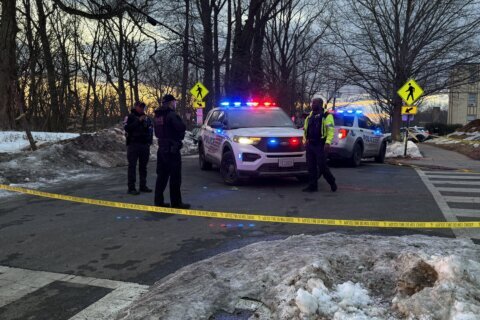Officials in D.C. say they’re planning to roll out an incentive program this summer that would offer some kind of financial reward for those who get COVID-19 vaccinations amid growing concern about a slowing pace of shots.
“We will be announcing more expansive financial incentive programs,” D.C. City Administrator Kevin Donohue told D.C. Council members during a weekly call Friday, at which he fielded a flurry of questions from the members on vaccine incentives in the District.
So far, D.C. has offered smaller-bore incentives, such as free beer or the opportunity to shoot a penalty kick at Audi Field.
However, Donohue said he couldn’t yet offer firm details on the financial incentive program just yet.
“I’m not in a position on this call to describe them, but we want to offer a variety of different financial incentives that will be spaced out over the course of the summer,” he said.
How well do they work?
Donohue referred to other big-ticket incentive programs, including the Vax-a-Million campaign in Ohio, which is offering the chance of a $1 million prize to those who get vaccinated. Ohio’s incentive has generated a lot of buzz and was cited in The New York Times as driving a bump in vaccinations in the state at a time when demand nationally fell.
“It seems to have had a positive effect on sign-ups for vaccines,” Donohue said.
But Donohue also pointed to research studying vaccination efforts for the flu and hepatitis B, which found that while financial incentives can entice people to roll up their sleeves, other factors may weigh more heavily.
For example, he said the research shows vaccine incentive programs offering between $50 and $100 can reduce hesitancy by about eight percentage points. But improving access and comfortability — seeing others you know get the shots — can reduce hesitancy by 15-30 percentage points, Donohue said.
There’s also a sweet spot in terms of the reward. According to research out of Boston University specifically on COVID-19 vaccine hesitancy, vaccine incentives that are too large can actually trigger more suspicion, especially in communities of color and in Republican-leaning groups, he said.
The District has already rolled out an incentive for D.C. government employees, who are eligible for an additional eight hours of leave if they are vaccinated.
A recent May 5 survey of District government employees, discussed on the call with council members, indicated 73% of respondents were already fully vaccinated. Another 9% said they were partially vaccinated; 3.5% said they weren’t vaccinated but planned to do so.
Another 8.7% of D.C. employees in the survey said they were not yet vaccinated and had no plans to do so.
Overall, about 3,500 D.C. employees filled out the survey. That’s about 9% of the total D.C. workforce, and officials acknowledged it’s not a representative sample and the survey likely had a “vaccine positivity bias.”
Slowing vaccines
The push to get shots in the arm comes amid a slowing down in the pace of vaccinations nationally and in the D.C. area.
About 52% of all D.C. residents and 68% of adults have received at least one dose of a COVID-19 vaccine, according to data from the Centers for Disease Control and Prevention.
President Joe Biden has set a national goal of 70% of all U.S. adults with at least one shot by July Fourth.
In D.C., the pace of shots administered to residents Ward 7 and 8 lag far behind other parts of the city. Overall, about 42% of all D.C. residents are fully vaccinated, compared to just 18% of residents in Ward 8 and 24% in Ward 7, according to D.C. data, which lags slightly behind CDC data.
“When you look at the existing map of who’s vaccinated, we have a tale of two cities,” said At-Large Council member Christina Henderson, who questioned the wisdom of the plan to phase out most of the District’s large-scale vaccine clinics by the end of the month, which was announced last week.
Dr. Ankoor Shah, principal senior deputy director at the D.C. Department of Health, said the large walk-up sits “are having very anemic show rates” in terms of the numbers of people visiting for vaccinations. Shah stressed that pharmacies and other clinics still allowed people to walk up to gets shots without appointments and closing the large sites allowed for the repositioning of staff to smaller-scale more targeted efforts through the city’s Vaccine Exchange program.
At-Large Council member Elissa Silverman said she wanted to hear more about how the city was planning to target the racial disparity in vaccination rates. “Our solution is, ‘Let’s keep doing the same thing we’re doing and hope that it gets better,’ instead of saying ‘What are we not doing that we could be doing,'” she said.
Shah said he disagreed with that assessment, saying boosting the vaccination rate of Black and brown residents was an “incredible problem that we’re actively worried about and want to solve.”
Later, Donohue, the city administrator, said he heard “the urgency of being able to change our vaccination levels in our Black and brown communities” and called it the “top priority of everyone involved in this response.”








